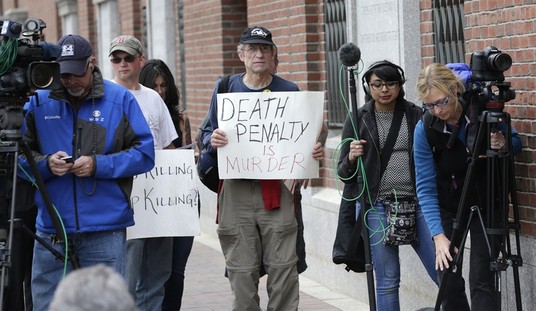It’s a tale of two cities. Cairo, where a reporter is given the treatment under Mubarak, and Chicago, where a law school fellow is given the treatment under Daley. Bonus question: guess in which city the following incident happened?
The same woman reappeared, this time signaling to two plainclothes men to come up behind me where I was seated. The woman stated that only the press were allowed to ask questions and that I would have to leave. While she was speaking to me, one of the men gave me a couple of solid hits in my back and then pushed me hard on my shoulder, almost knocking me out of my chair.
If you guessed Chicago, you guessed right. It’s by John Lott, who describes the vendetta that Richard Daley unleashed on him for daring to portray His Honor in slightly less than flattering terms. Not only did they run him out the room, they pressured the Dean to kick him out of town. All for dissing Daley. Chicago is living proof that authoritarian regimes can live nearly forever and that voters can rise from the dead. But if Chicago can be nasty, so can Cairo. The real Cairene anecdote is from journalist Robert Tait, who talks about his experiences after being arrested in the recent crackdown.
The sickening, rapid clicking sound of the electrocution devices — like an angry rattlesnake on the attack — is what haunts me still; that and the agonized wailing, followed by a pitiful whimpering and occasional pleas for mercy of the handcuffed, blindfolded victims as they were propelled across the floor by the force of the shocks.
My palms sweated and my heart raced furiously as the sinister noise came within inches of me, together with the thumps of vicious punches and kicks against the prone bodies next to me.
I listened uncomprehending but spellbound to the torturers’ abusive shouts in Arabic. Blindfolded, bound, and lying on the floor like the others, I wondered if my turn would come. Thankfully, it never did, although the brutality continued, almost unabated, for hours. Rendered immune no doubt by my British nationality, I had become an island, an untouchable, in an orgy of violence. It was somehow what I expected yet it made the experience no less frightening.
Readers who have also read my novel may remember the scene from a cell long ago and far away from both Cairo and Chicago.
The cell door clanged open. Two men in short-sleeved khaki uniforms came in and took Alex down the corridor into Col. Bobadilla’s office. The man behind the gray metal desk had a squat face and slanted eyes, looking for all the world like a Mongolian sadist from Central Casting. Bobadilla was in charge of M2, the premier counterintelligence force of the Marcos regime.
The men pushed Alex into the brightly lit, air-conditioned room and pinioned his arms. The Colonel was reading Alex’s dossier. A baseball bat studded with nails hung in a rack on the wall beside a picture of Bobadilla posing with President Marcos.
“Francisco,” he said. “You are a reasonable man, an educated man. We’ve heard about you from other people we’ve interrogated and have been looking forward to meeting you. We know that you’re not a Commie, in fact, the Commies rather hate you for reasons we don’t completely understand. It would be a pity if we had to give you the Commie treatment when we might make common cause against people we mutually dislike. Throw in with us and tell us what you know.” Bobadilla pushed his chair back until he was just under his spiky baseball bat. “We can be friends,” he said.
They were offering him a deal. That’s why he was in a cell with Medding. He was in with the dealers. It was an easy choice. Down one road lay the agony of electric prods and heated pliers. Down the other was a new identity, a steady income and eventual membership in an elite that could mete out life or death with impunity.
“You’re right about my hating those Commies, Colonel. They’re sanctimonious and slimy bastards. I hate them. There’s only one problem.”
Bobadilla looked at him slyly, waiting for the bargaining to start. He had heard all the requests: anonymity, money, a government position, drugs, maybe even a visa abroad. He was prepared, within reason, to accommodate them all.
“Tell me what the problem is so we can work it out.”
“Problem is that I hate you more.”
Bobadilla could hit like a truck. Alex barely saw the fist coming. The man sprang up like a Jack in the Box and gave him a right to the solar plexus. It doubled him over and dumped him on the floor. Bobadilla stood over him and barked out orders.
“Give him a medical examination and then take him to tactical interrogation. Give him the works.”
Yes, those things can really happen. Nice to know that some things never really change. Back in the Marcos days they didn’t even bother tying the victim to a rack. They had a collection of doors pulled off their hinges which served as frames.
The following story is also from Cairo and linked at the other end by Chicago. The Wire reports on the analysis of Standpoint Magazine’s Shiraz Maher, an ex-Islamist who thinks that the Obama administration really blew a chance to get ahead of the political trends in Egypt.
Maher reports regularly for Standpoint magazine, where he also co-authors with Alexander Meleagrou-Hitchens a popular blog that monitors and comments on every shade of Islamist extremism. He returned earlier this week from the vertiginous streets of Cairo where he witnessed anti-Mubarak protestors and pro-Mubarak regime agents square off in one of the only violent episodes of what has so far been a series of peaceful, democratic demonstrations.
Just Journalism Executive Director Michael Weiss recently spoke with Maher about Egypt, the Muslim Brotherhood and the deliberate targeting of journalists.
Michael Weiss: You just returned from Cairo. What were you impressions of the protestors? Is this a revolution that the West ought to be worried about or embrace unequivocally?
Shiraz Maher: There are very few things that should be embraced unequivocally. The Cairo revolt merits close inspection but unfortunately some sections of the commentariat have been too quick to rush to judgment. Quite often, they have done so without going anywhere near Egypt. After spending a week talking to protesters in Tahrir Square and many of the main opposition leaders, my impression is that the West has squandered an amazing opportunity here. This movement emerged as a ‘leaderless revolt’ organised through social networking sites and mobile phones. It started with the youth, but has received broad support from all sections of Egyptian society.
I saw everyone you could think of in the Square: old men and women, peasants from the countryside, gilded urban youth, members of the upwardly mobile middle classes. One man even brought his newborn to Tahrir Square proclaiming her ‘the youngest revolutionary’ (she was one month old). You only had to speak with these guys to realise that they are not seeking an Islamist revolt. This is not 1979 or an attempt to turn Cairo into Kabul. The language of the protesters is framed through the idioms of ‘freedom’, ‘liberty’, and ‘human rights’. These people want their dignity back. Lots of Christians attended the protests too, and people were very alive to the fact that the West fears an Islamist revolt. They went out of their way to make it clear that this is a secular movement. Western leaders, and Obama in particular, have made a disastrous miscalculation by not supporting these protesters with more vigour.
Whether the revolt was leaderless at the outset or not is for historians to debate. But it won’t remain leaderless for long. Lee Smith at the Weekly Standard, who links to the Maher interview above, also links to the disappearance of Egyptian blogger Kareem Amer.
He spoke with CyberDissidents.org on Saturday and urged us to continue highlighting violations of human rights in Egypt. A few weeks ago, we asked Kareem about his four years in prison. “Freedom is worth the sacrifice,” he said.
That was Kareem’s call and maybe he wouldn’t have it any other way. But disappearances have a way of lasting forever. In any prolonged confrontation with an authoritarian regime survival will depend on the organization which can supply the safe houses, funds, training and comms. The middle class idealists don’t realize it at first, but by and by the school of hard knocks teaches a harsh lesson. By letting the unrest in Egypt simmer on, and consequently exposing a wide section of the Egyptian middle class to Mubarak’s tender mercies, the Obama administration will eventually fill up the recruiting pipeline of the men from the underground. Repression has a way of completely eroding the middle. And whatever little you started with at the beginning will be smaller by the end. Unless the uncommitted rebels start their own underground and support system. You can’t fight Daley or Mubarak entirely from the open. Both the men from Chicago and Cairo should know that, and maybe the really worrisome thing is that they do.
“No Way In” print edition at Amazon
Tip Jar or Subscribe for $5










Join the conversation as a VIP Member